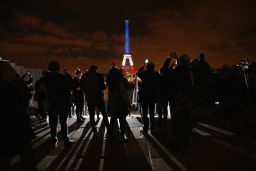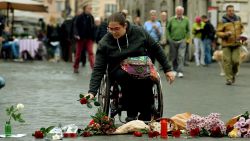Story highlights
France's state of emergency will expire without parliamentary approval
EU article requires countries to do all in their power to help if one of their number is attacked
France has stepped up air strikes on ISIS in Syria following Friday's terrorist attacks
Once again Wednesday, the French President used the W-word: France, he said, is at war.
The terrorist group ISIS, President Francois Hollande said, “has an army, financial resources, oil resources, and occupies a territory.”
In other words, last Friday’s terrorist attacks in Paris that killed 129 people, which authorities believe were committed by ISIS, were perpetrated by something that looks pretty much like a country.
Paris attacks: Get up to speed
Hollande wants to rally his nation – to forge the kind of unity that nations rarely exhibit in times of peace. But there may be more legalistic reasons, as well.
The French President wants what amounts to war powers at home. And he is choosing not to invoke an article of one of the European Union treaties that requires member states to help in case of “a terrorist attack.”
Instead, Holland wants to invoke Article 42.7 of another treaty – the Treaty on European Union – that applies to war. Article 42.7 requires EU countries to do all they can to help when one of their own is the “victim of armed aggression.”
This would mark the first time the article has ever been invoked.
What did Hollande request?
Essentially two things:
He said he would ask the French Parliament to extend France’s state of emergency for three months.
The French President also said he’d appeal to world leaders – including meetings next week with U.S. President Barack Obama and Russian President Vladimir Putin, who have been at odds on what to do in the ISIS stronghold of Syria – to form a wider coalition to go after the group.
French jets bomb ISIS stronghold of Raqqa
What would be the effect?
The state of emergency is already in effect. Hollande declared it immediately after Friday’s attacks.

But in France the president can only declare a state of emergency for 12 days. So on Wednesday, Hollande will ask Parliament to extend it for three months.
A state of emergency gives authorities a range of powers, including the right to ban mass gatherings, close public spaces, limit the movement of people, search houses without court orders, and confiscate some weapons even if they’re legal.
Article 42.7 of the Treaty on European Union – the “mutual assistance clause” – is not specific. But it requires European Union countries, if one of their number suffers armed aggression on its territory, to render “aid and assistance by all the means in their power.”
What is Hollande asking of other EU countries?
Those conversations have so far been private. In public, Hollande has not been specific about what he wants other countries to do.
However, judging from his rhetoric – and from France’s actions since the attack – Hollande clearly believes the response to ISIS must have a strong military component.
The Syrian Observatory for Human Rights, a London-based monitoring group, said Wednesday that 33 members of ISIS had been killed by French and other military airstrikes in the last 72 hours. The organization said dozens of families of ISIS leaders and members, most of them non-Syrians, were abandoning Raqqa – where ISIS has its Syrian headquarters – and were headed to the northern Iraqi city of Mosul.
Given Hollande’s actions and his repeated use of the word “war,” it seems safe to presume he wants to form a broad coalition that will take robust military action against ISIS.
Opinion: The inconvenient truth about war on ISIS
How have other countries responded?
So far other countries have – at least in public – been long on sympathy and short on specifics.
But that may change as other EU leaders look at the threats to their own counties.
And Hollande has a certain ally in one non-EU member – Russia – which has already been targeting ISIS, and which had a passenger plane brought down – by ISIS, it is thought – in Egypt’s Sinai on October 31.
Obama, who came to office promising to extricate the U.S. from Mideast entanglements may come under political pressure to step up action against ISIS.
Will Hollande go to NATO next?
Almost certainly.
Whereas the EU is a political project, NATO is a military alliance. Collective defense is what NATO is all about.
And military action appears to be much on Hollande’s mind.
Article 5 of the North Atlantic Treaty states that an attack on one ally shall be considered an attack on all.
It has been invoked only once: following the terrorist attacks in the U.S. on September 11, 2001, which killed nearly 3,000 people.






















